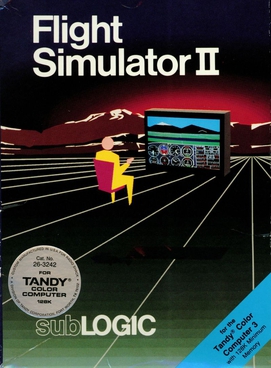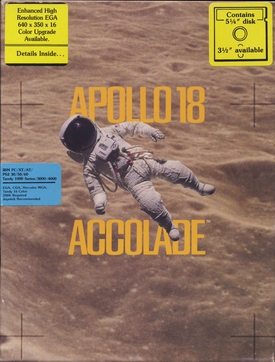
Balance of Power is a strategy video game of geopolitics during the Cold War, created by Chris Crawford and published in 1985 on the Macintosh by Mindscape, followed by ports to a variety of platforms over the next two years.

The Pawn is an interactive fiction game for the Sinclair QL written by Rob Steggles of Magnetic Scrolls and published by Sinclair Research in 1985. In 1986, graphics were added and the game was released for additional home computers by Rainbird.

Leisure Suit Larry in the Land of the Lounge Lizards is a graphic adventure game, developed by Sierra On-Line, and published in 1987. It was developed for the PC, DOS, and the Apple II and later ported to other platforms, such as the Amiga, Atari ST, Apple IIGS, Macintosh, and Tandy Color Computer 3. It utilizes the Adventure Game Interpreter (AGI) engine. In 1991, Sierra released a remake titled Leisure Suit Larry 1: In the Land of the Lounge Lizards for PC DOS, Apple Macintosh, and Amiga. This version used the Sierra's Creative Interpreter (SCI) engine, featuring 256 colors and a point-and-click, icon-driven user interface.

Fire Power is a military tank action game developed by Silent Software for the Amiga. It was released in 1987 and published by MicroIllusions and Activision. Ports were released for the Apple IIGS, the Commodore 64 and for MS-DOS in 1988. An Atari Lynx version was planned but development never started due to internal conflict with Epyx.

The Kristal is an adventure game first released in 1989 for the Amiga computer. It was later released for the Atari ST and MS-DOS. It was developed by the UK-based company Fissionchip Software, and published in Europe by Addictive Games and in the US by Cinemaware. Unusually for a video game, the game is based on a play, The Kristal of Konos, written in 1976; the authors of the play worked together with the game developers and the play was never shown in theatres or on film before the game's release. A dialog introducing the setting was recorded by Patrick Moore, who introduced both the game and play.

Shanghai is a computerized version of mahjong solitaire published by Activision in 1986 for the Amiga, Atari ST, Atari 8-bit computers, Commodore 64, MS-DOS, classic Mac OS, Apple IIGS, and Master System. Shanghai was originally programmed by Brodie Lockard. It was released as an arcade video game by Sunsoft in 1988.

The Chessmaster 2000 is a computer chess game by The Software Toolworks. It was the first in the Chessmaster series and published in 1986. It was released for Amiga, Apple II, Atari 8-bit computers, Atari ST, ZX Spectrum, Commodore 64, Amstrad CPC, MSX, Macintosh, and IBM PC compatibles.

Temple of Apshai Trilogy is a remake of three games from the Dunjonquest series, Temple of Apshai, Upper Reaches of Apshai, and Curse of Ra.

Ports of Call is a 1986 business simulation game developed by German duo Rolf-Dieter Klein and Martin Ulrich, and published by Aegis Interactive Entertainment. It was initially released for AmigaOS. After a subsequent early release for DOS it was also made available to a number of different platforms over the years, including Windows, iOS, Android and as a browser game.

Flight Simulator II is a video game developed by Bruce Artwick and published by Sublogic as the sequel to FS1 Flight Simulator. It was released in December 1983 for the Apple II, in 1984 for Atari 8-bit computers and Commodore 64, in 1986 for the Amiga and Atari ST, the Atari XEGS as a pack-in title in 1987, and in August 1988 for the Color Computer 3.

Trump Castle is a series of gambling video games published by Capstone Software between 1989 and 1993. The games are named after Trump's Castle hotel-casino in Atlantic City, New Jersey, and were released for Amiga, Atari ST, Commodore 64, Commodore 128, and MS-DOS.

Relax is a suite of self-improvement software written by Kelly Jones and Bill Williams for Atari 8-bit computers and published by Synapse Software in 1984. Subtitled "The Stress Reduction System", Relax uses a headband containing sensors attached to electromyograph hardware to provide audio/visual feedback in three interactive programs. It also includes a 25-minute cassette tape of guided relaxation.

Golden Oldies: Volume 1 - Computer Software Classics is a retrospective compilation of four video games from prior to the microcomputer era: Adventure, Eliza, Life, and Pong. It was published in 1985 for the Apple II, Atari 8-bit computers, Commodore 64, and MS-DOS. Atari ST and Amiga versions followed in 1986. Despite the "Volume 1" in the title, no further collections were released.

Paul Whitehead Teaches Chess is a 1985 video game published by Enlightenment, Inc.

Apollo 18: Mission to the Moon is a 1987 video game published by Accolade and developed by Canadian studio Artech.

The Fidelity Chessmaster 2100 is a 1988 video game published by The Software Toolworks. An Atari ST version was advertised but never released. A Sega Mega Drive version was also planned and shown at Winter CES 1992 but was never released.

Sargon 4 is a 1988 chess video game published by Spinnaker Software. It is part of the Sargon series and a sequel to Sargon III.

The Bugs Bunny Cartoon Workshop is a 1990 video game published by Hi Tech Expressions. Amiga and Macintosh versions were planned but were never released.
The Animation Studio is a 1991 software published by Walt Disney Software.


















